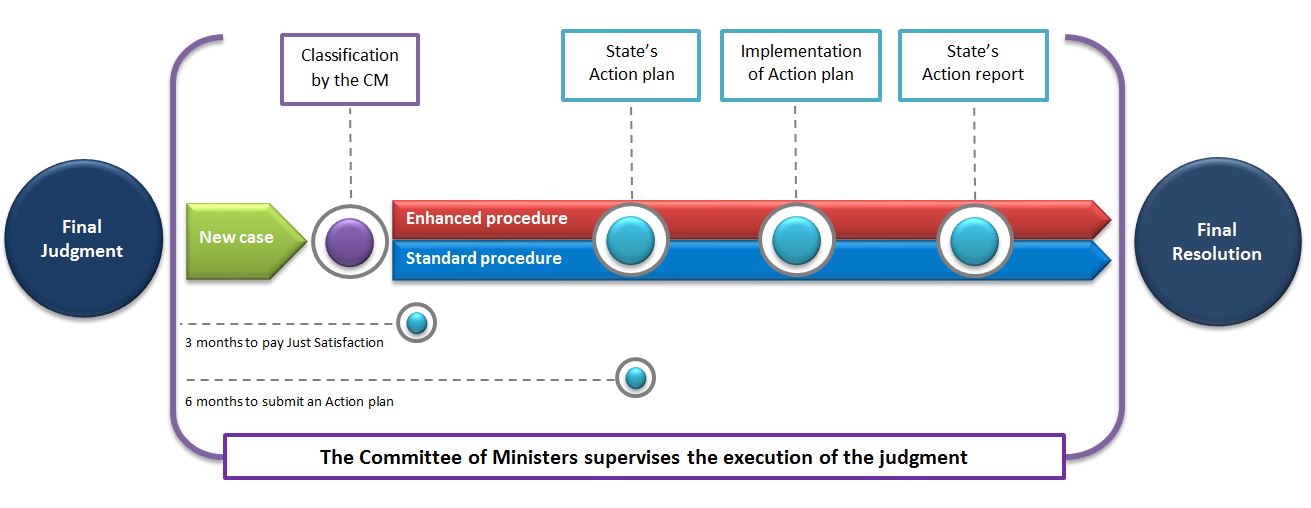The supervision process
Member states have undertaken to comply with final judgments of the European Court of Human Rights (the Court) finding violations of the European Convention of Human Rights (the Convention), as well as with Court decisions taking note of friendly settlements (see Articles 46 and 39.4 of the Convention).
Article 46
Binding force and execution of judgments
Binding force and execution of judgments
1. The High Contracting Parties undertake to abide by the final judgment of the Court in any case to which they are parties.
2. The final judgment of the Court shall be transmitted to the Committee of Ministers, which shall supervise its execution.
3. If the Committee of Ministers considers that the supervision of the execution of a final judgment is hindered by a problem of interpretation of the judgment, it may refer the matter to the Court for a ruling on the question of interpretation. A referral decision shall require a majority vote of two-thirds of the representatives entitled to sit on the committee.
4. If the Committee of Ministers considers that a High Contracting Party refuses to abide by a final judgment in a case to which it is a party, it may, after serving formal notice on that Party and by decision adopted by a majority vote of two-thirds of the representatives entitled to sit on the committee, refer to the Court the question whether that Party has failed to fulfil its obligation under paragraph1. 5. If the Court finds a violation of paragraph 1, it shall refer the case to the Committee of Ministers for consideration of the measures to be taken. If the Court finds no violation of paragraph 1, it shall refer the case to the Committee of Ministers, which shall close its examination of the case.
Article 39
Friendly settlements
Friendly settlements
1. At any stage of the proceedings, the Court may place itself at the disposal of the parties concerned with a view to securing a friendly settlement of the matter on the basis of respect for human rights as defined in the Convention and the Protocols thereto.
2. Proceedings conducted under paragraph 1 shall be confidential.
3. If a friendly settlement is effected, the Court shall strike the case out of its list by means of a decision which shall be confined to a brief statement of the facts and of the solution reached.
4. This decision shall be transmitted to the Committee of Ministers, which shall supervise the execution of the terms of the friendly settlement as set out in the decision.
The adoption of the necessary execution measures is supervised by the Committee of Ministers of the Council of Europe, made up of representatives of the governments of the 46 member states, assisted by the Department for the Execution of Judgments of the Court (Directorate General I of Human Rights and Rule of Law).
The states have a legal obligation to remedy the violations found but enjoy a margin of appreciation as regards the means to be used. The measures to be taken are, in principle, identified by the state concerned, under supervision of the Committee of Ministers. The Court can assist the execution process, in particular through the pilot-judgment procedure (used in case of major structural problems).
Measures to be taken may relate to the individual applicant or be of a general nature.
Individual measures
Execution measures must first put an end to the violation and remedy, as far as possible, its negative consequences for the applicant.
This implies the payment of any sum awarded by the Court as just satisfaction or agreed between the parties in a friendly settlement. Default interest is due in case of late payment.
When mere monetary compensation cannot adequately erase the consequences of a violation, the Committee of Ministers makes sure that the authorities take any other individual measures which may be required to remedy the violation. The judgments themselves contain on occasion additional recommendations.
Examples of individual measures
- Restoration of contacts (subject to the best interest of the child) between children and parents unduly separated from them (e.g. in case of children placed in foster care or kidnapped by the other parent)
- Reopening of unfair criminal proceedings
- Revocation of expulsion orders that would have exposed the applicants to risks of torture or ill-treatment, or life threatening circumstances in the country of destination
General measures
Execution of judgments also requires general measures to prevent violations similar to those found by the Court (whether through changes of legislation, case law or through other kinds of measures). Ensuring the effectiveness of domestic remedies is an important concern.
Where domestic authorities give direct effect to the Court's judgments and jurisprudence, publication and dissemination of the judgments, where necessary translated and commented, is frequently sufficient to achieve necessary changes and to ensure effective domestic remedies.
Examples of general measures
- Introduction of effective remedies against excessive length of court proceedings
- Removal of discrimination against children born out of wedlock (e.g. in inheritance matters)
- Adoption of legislation to prevent arbitrary recourse to telephone-tapping
- Lifting of undue restrictions on journalists' freedom of expression
The Committee of Ministers ensures continuous supervision of the execution of judgments and decisions of the European Court of Human Rights. Cases remain under supervision until the required measures have been taken. Supervision is then closed by a final resolution.
Once judgments and decisions become final, states indicate to the Committee of Ministers as soon as possible the measures planned and/ or taken in an "action plan". Once all the measures have been taken, an "action report" is submitted. During the supervision process, applicants, NGOs and National Institutions for the promotion and protection of Human Rights can submit communications, in writing.
The supervision of the adoption and implementation of action plans has followed a new twin-track procedure since January 2011. Most cases follow the standard procedure. An enhanced procedure is used for cases requiring urgent individual measures or revealing important structural problems (in particular pilot-judgments) and for inter-state cases.
Where necessary, the Committee of Ministers may assist execution in different ways, notably through recommendations set out in decisions and interim resolutions. The Council of Europe can provide states with additional support in the form of targeted programs where so requested (e.g. legal exper-tise, round tables or training activities). Support can also be provided through the Human Rights Trust Fund.





